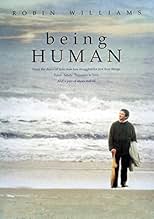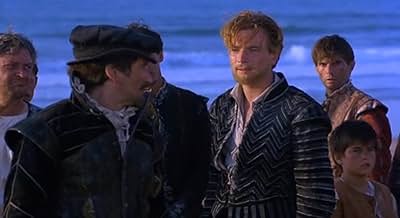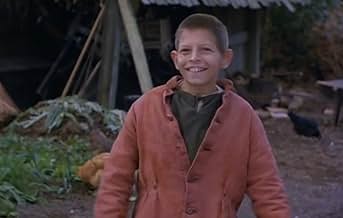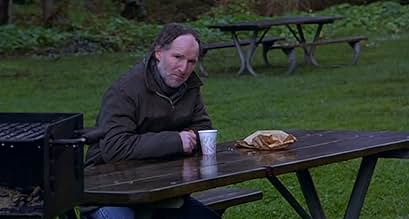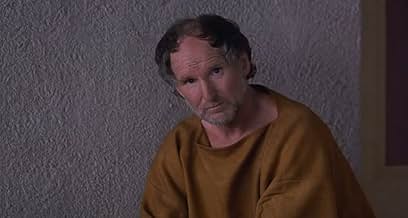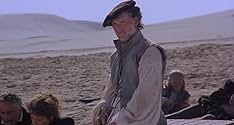Aggiungi una trama nella tua linguaA man's blunders regarding his family are told and retold through different eras in history.A man's blunders regarding his family are told and retold through different eras in history.A man's blunders regarding his family are told and retold through different eras in history.
- Regia
- Sceneggiatura
- Star
- Raider
- (as Andy Flanagan)
Recensioni in evidenza
Travelling through different countries and periods of time, going from the Celts cavemen to the modern New York businessman, "Being Human" has Robin Williams playing a character named Hector and his appearances in distinct centuries trying to learn what means to be a human being. In the five short stories created here, Hector, living as a Celtic in the highlands, had his wife and children taken away by barbarians; was the slave of a dumb master (John Turturro) in a more civilized era; a married man who fell in love with a foreign woman, a few centuries later; a military during the Portugual's Maritime Expansion on Africa, conquering new lands and new treasures; and as a troubled divorced man trying to reconciliate with his children of whom he hasn't seen since the end of his marriage. The movie fails in being real or accurate enough in all of the stories except in the last one which is very close to us.
Slow, of mannered delivery and hardly getting better as the stories unfold, "Being Human" is the kind of film that really follows its lessons, it'll only grow on you after countless views. In my case four attempts, of these in two I fell asleep (but always believing that there was something interesting there), one in which I watched the whole thing and didn't like and the last one in which my perception changed and end up being a good film, far from being a masterpiece that it could be. So, you'll have to watch this film over and over until you get something from it, then you can evolve into really saying if this is a good or a bad film.
This whole idea of a man trapped in strange and quite horrendous situations where every kind of decision ruin his life but always running to something else thinking it'll be better and lead him to a good life, was brilliantly presented in a book called "The Star Rover" by Jack London. In it, the main character is a prisoner that can recall his past lives as a way of escaping from his current pain of being tortured. But in those lives things don't get any better and he's always getting into more and more trouble. "Being Human" falls as a pretentious art film with symbolisms that never work and stories that are difficult to be involved with. Luckily, they have Williams as a main actor and we root for him whatever the Hector he's playing. We care for Hector in all of his situations because there's something there that is involving enough to make us imagining what kind of decisions we would make if we were him. In at least, one of the stories you'll put yourself into Hector's shoes.
Won't blame director/writer Bill Forsyth for the flaws presented here since this is not his original project, Warner Bros. Forced him to cut the film and include a narration that is quite excessive and too much explanatory. The narration (provided by Theresa Russell) of a film destined to grown up's treats its audience as children, explaining many things we're seeing on the screen. It ruined some parts of the film. Result: poor criticism, a box-office failure and now who knows this film? I sincerely hope that one day Forsyth come out of the shadows and show to the world this film in its integrity in a director's cut DVD (even the known version is hard to find).
The things that attracted me into "Being Human" are the quality of the performances, not only Williams but also Turturro, Lorraine Bracco, Hector Elizondo, Jonathan Hyde, Anna Galiena, William H. Macy among others; the beautiful cinematography; Michael Gibbs fantastic musical score (specially the music presented when the movie enters into the 20th Century, a highly agitated theme). The story, at times, knows how to hold our interest but only for those who have an open mind to accept the concept of a man living over and over a similar life that bears only difference of costumes and periods of time. Hector's conditions and the way love acts in his life are quite the same, yet he fails to learn something from these experiences.
Very problematic but not enough to make you feel bad about it, "Being Human" comes as a good film about valuable and noble lessons that sometimes crosses our paths in this long journey of life. 7/10.
I appreciated the attempt to portray the ordinariness of life throughout the ages and I view the slowness of the film in this light. Life is often slow. These were interesting vignette-like character studies of one man who is never able to be completely in control of situations around him, but who perseveres.
An attentive viewer is amply rewarded by director Bill Forsyth--if you are a casual viewer you will wonder what is happening and consider the film to be disjointed and hence poor entertainment.
Non-linear narratives are not Forsyth's invention--such films have adorned French and Hungarian cinema for decades. "Being Human" is above average in that company merely because of fine performances from Williams, the beautiful Anna Galiena (Beatrice) an Italian actress, Hector Elizondo, John Turturro, William Macy, and Ewan McGregor to mention a few.
While the imaginative storytelling technique was impressive, Forsyth never explains who the lady narrator is. Are we expected to imagine it to be Hector's new love? The gradual jumps in time scales, gives us a socio-historical perspective into Hector's education in life, seen through the eyes of his children. Forsyth is interesting but not the best director using this technique. His film demands attention, both literally and figuratively.
I understand that the director disowns the film after the studios forced him to truncate the film by 40 minutes. Probably the director's cut is far superior to the present version and is likely to be more satisfying to a discerning viewer.
*Being Human* is a slow and philosophical story--as the title suggests, it's a story about what it is to be human. Love, loss, slavery, hopelessness, faithfulness, lust, hope--all these themes are touched upon as the story moves throughout the ages, presenting us with various Everyman characters all played by Robin Williams in what are surely his best dramatic performances.
This film is much like *My Dinner with Andre*--a truly meaningful and important film which isn't meant to appeal to everyone, just a more intellectual crowd. Its unfortunate spate of negative reviews comes from the fact that, unlike *My Dinner with Andre*, it was targeted for broader public consumption with a fairly large theatrical release, and to this day plays on premium cable channels to audiences who want to be watching fast-paced blockbusters rather than introspections into our humanity.
If you can appreciate a film with a slower and more deliberate pace and real insights into humanity, watch *Being Human*. It's a masterpiece.
Lo sapevi?
- QuizDue to adverse reaction at preview screenings, Warner Bros instructed the director, Bill Forsyth, to trim the film by 40 minutes as well as adding narration and a happy ending. Forsyth subsequently disowned the film as a result.
- Citazioni
[first lines]
The Storyteller: This is the story of a story. Once upon a time there was this story, and the story said to itself, how should I begin?
Hector: Try the usual way.
The Storyteller: What, in the dark with a man and a woman, in a story that is still to tell itself?
Hector: Well, you've got to start somewhere. Say, long long ago... Or, far far away... Or, another time in a different distant country... Or just, once...
The Storyteller: That's good. "Far away", so you know the place is close to your own heart. "Once" is nice, so we know that it always happens. Hmm, Once there was this hero...
Hector: [wryly] Some hero.
The Storyteller: Some man then. Any man. Say, a man, a woman, and some children. Don't forget the children.
I più visti
- How long is Being Human?Powered by Alexa
Dettagli
Botteghino
- Budget
- 40.000.000 USD (previsto)
- Lordo Stati Uniti e Canada
- 1.519.366 USD
- Fine settimana di apertura Stati Uniti e Canada
- 764.011 USD
- 8 mag 1994
- Lordo in tutto il mondo
- 1.519.366 USD
- Tempo di esecuzione
- 2h 2min(122 min)
- Mix di suoni
- Proporzioni
- 1.85 : 1



